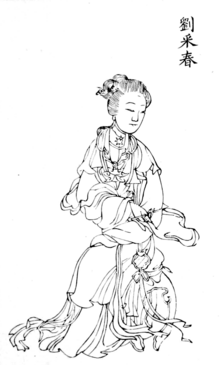Liu Caichun (simplified Chinese: 刘采春; traditional Chinese: 劉採春; pinyin: Liú Cǎichūn) was a courtesan, actress, and poet in the Tang Dynasty. Along with Xue Tao, Yu Xuanji and Li Ye she became known as one of the most famous female poets of the Tang Dynasty. Together they are referred to as "the four great female poets of the Tang Dynasty".
Biography
Liu Caichun is believed to have come from a poor family. Though her exact origin is unknown, it has been suggested that she was from Huaidian, Zhejiang, or Yangzhou. She formed a traveling drama troupe together with her husband, Zhou Jicong, that was known to have performed adjutant plays (參軍). Described as an excellent singer, her singing of Watching for my Husband is reported to have brought audiences to tears. Liu Caichun had a daughter with Zhou Jicong named Zhou Dehua(周德华), who also became a successful courtesan. During Yuan Zhen's time as governor of Yuezhou and East Zhejiang, Liu Caichun arrived in Yuezhou with her troupe, where Yuan Zhen is said to have appreciated her work. During this time, Liu Caichun became the target of the affections of Yuan Zhen, who abandoned his pursuit of Xue Tao after falling for Liu Caichun. Yuan Zhen is known to have composed a poem dedicated to Liu Caichun in which he describes her makeup and her singing. She maintained contact with Yuan Zhen for seven years before their relationship ended.There is no record of Liu Caichun's death in the historical record, so it is unknown what happened to her later in life.
Personal poetry
Although several poems are attributed to Liu Caichun and she is considered among "the four great female poets of the Tang Dynasty", it is unclear if any of the poems attributed to her were actually written by her as Fan Shu records that they were composed by contemporary literati. Although many works attributed to her have been lost, the collection of six poems titled The Song of Luogen has been preserved.
References
- Barnstone, Tony; Ping, Chou (2010-03-03). The Anchor Book of Chinese Poetry: From Ancient to Contemporary, The Full 3000-Year Tradition. Knopf Doubleday Publishing Group. ISBN 978-0-307-48147-4.
- "The four great female poets in the Tang Dynasty".
- Zheng, Zhenduo (2021-10-28). History of Chinese Folk Literature. Springer Nature. p. 267. ISBN 978-981-16-5445-9.
- Barnstone, Tony; Ping, Chou (2010-03-03). The Anchor Book of Chinese Poetry: From Ancient to Contemporary, The Full 3000-Year Tradition. Knopf Doubleday Publishing Group. p. 181. ISBN 978-0-307-48147-4.
- ^ Li, Xifan (2022-10-03). A General History of Chinese Art: Sui and Tang Dynasties. Walter de Gruyter GmbH & Co KG. ISBN 978-3-11-079095-5.
- Delos. National Translation Center. 1998. p. 94.
- Jao, Tsung-i (2022-12-12). Treasured Oases: A Selection of Jao Tsung-i's Dunhuang Studies. BRILL. ISBN 978-90-04-52255-8.
- Geng, Lin (2021-04-06). A Comprehensive Study of Tang Poetry II. Routledge. ISBN 978-1-000-28371-6.
- Idema, Wilt L.; Grant, Beata (2020-03-23). The Red Brush: Writing Women of Imperial China. BRILL. p. 188. ISBN 978-1-68417-394-5.
- "Guangming Cultural Weekend·Elegant Fun: Talking about "Boudoir"".
- "A Supplement to the Biography of Liu Caichun in the Complete Tang Poems".
- Xiang, Mao; Huai, Yu (2020-01-21). Plum Shadows and Plank Bridge: Two Memoirs About Courtesans. Columbia University Press. ISBN 978-0-231-54686-7.
- "Source: The Anchor Book of Chinese Poetry". chinesepoetrytranslation.org. Retrieved 2024-08-08.
- Barnstone, Tony; Ping, Chou (2010-03-03). The Anchor Book of Chinese Poetry: From Ancient to Contemporary, The Full 3000-Year Tradition. Knopf Doubleday Publishing Group. ISBN 978-0-307-48147-4.
External links
- 刘采春 at Baidu Baike (in Chinese)
